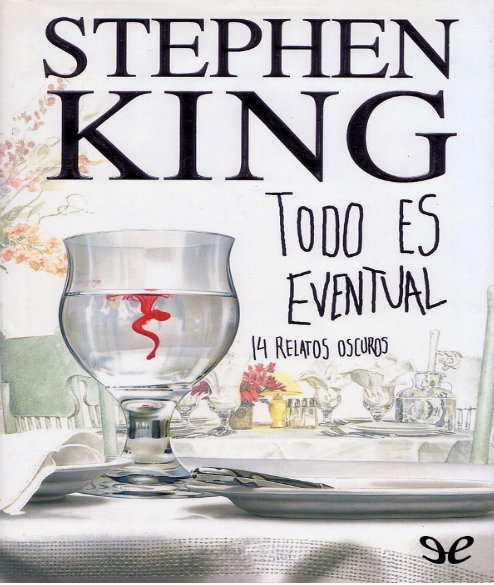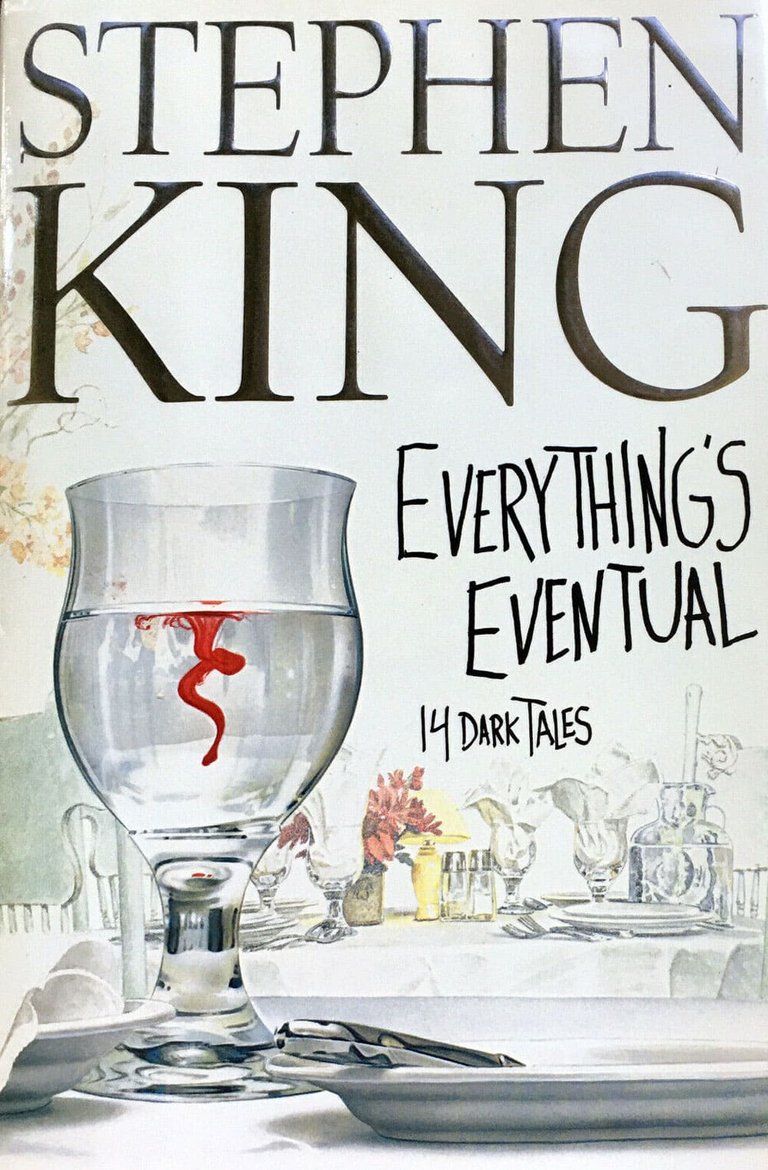
Siempre me gustaron los cuentos cortos (o relativamente cortos) de aquellos autores (como es el caso de Stephen King) en los que la lectura debe hacerse con mucho cuidado, en forma lenta, pausada, tratando de interpretar en cada párrafo lo que ha tratado de decir el autor. No es fácil obviamente.
De Stephen King he leído varios libros de la extensa bibliografía del escritor del Maine, llamado por algunos el “rey del horror”. Tal vez lo de rey tenga mucho que ver con su apellido (que entre otras cosas es verdadero, no es un pseudónimo).
Después de un tiempo bastante largo que he debido dedicar a la Universidad (el curso de ingreso y el primer año no son fáciles para nadie) he tenido tiempo de volver a leer a mis autores preferidos y, entre ellos. Stephen King.
Como tenía miedo de interrumpir el libro varias veces, elegí esta serie de cuentos titulada Todo es eventual: 14 relatos oscuros donde puedo leer sin problemas un cuento por día o en el momento que tiempo el tiempo libre suficiente.
La lectura tranquila de cada cuento no les debería llevar (si quieren intentarlo) más de horas.
Si bien el componente “fantasy” está siempre presente, tal vez sean los cuentos, al menos algunos más cercanos a la “realidad” a ese “mundo real” que, como el mismo autor insiste, es paralelo al otro mundo, imaginario.
Voy a tratar de compartir con los amigos #hivers de esta Comunidad un cuento por post. Todos sin lugar a dudas, brillantemente escritos.
Como bien dice King: ni el arte de escribir ni el de leer son artes perdidas. Solo están un poco debajo de la superficie. Y a veces hay que hacer algún esfuerzo para levantarlos y hacerlos más visibles.
Al final de cada cuento, en breves párrafos, King explica la fuente inspiradora de cada cuento. ¡Y oh! Sorpresa en casi todos ellos la fuente es un acontecimiento de la vida real vivido por el autor en primera persona.
Sala de Autopsias número 4.
Uno de los mejores cuentos de King donde la fantasía y el horror (o miedo, en este caso) están más latentes que presentes, en cada página.
El personaje principal (Howard Cottrell) es un agente de cambios y se despierta -por así decirlo- en la sala de un hospital donde se practican las autopsias.
Está perfectamente consciente, pero no puede hablar ni mover ningún músculo. Escucha, en cambio, todo lo que dicen la doctora y los enfermeros que se preparan para hacer la autopsia. El corazón no late y clínicamente Howard está muerto. Sin embargo, no es así.
Con el pasar de los minutos y entre la conversación y bromas con que alternan el diálogo los integrantes del cuerpo médico, se da cuenta de haber sido mordido por una serpiente en el parque, donde acostumbraba a descansar al mediodía en la hora de la pausa para comer.
Cuando el servicio médico de emergencias llega al lugar encuentra la serpiente que escapa de la bolsa de sus indumentos en los que se había refugiado y confirman el diagnóstico a sus supervisores: muerte a cauda de mordedura de una serpiente venenosa.
Lo que ignoran es que la mordedura de esta serpiente originaria de América Central no es venenosa, aunque por un cierto tiempo para liza los músculos de todo el cuerpo, incluso los del corazón.
Ver que el bisturí se acerca a su tórax para hacerle la clásica incisión a forma de Y cuando está todavía vivo le produce un sentimiento de angustia indefinible.
En el momento llega uno de los enfermeros diciendo que han recuperado la serpiente, lo han analizado y han descubierto que la toxina de su mordedura no es fatal sino solo paralizante.
Las suposiciones o leyendas metropolitanas que algunas personas han sido enterradas vivas no es nuevo y muchos autores y directores de cine de prestigio han tratado el tema más de una vez con distintos resultados.
Tal vez el ejemplo más notorio sea el de la célebre serie Alfred Hitchcock Presenta en el que Joseph Cotten interpreta a un hombre que luego de un accidente automovilístico queda inerme, aparentemente muerto.
También en este caso la fuente inspiradora de King después de tantos años está por ser prácticamente destripada viva con la autopsia cuando el paciente logra derramar una sola lágrima en su desesperación para hacer entender a los médicos que está vivo.
La serie de cuentos completa.
Los catorce relatos:
- Sala de autopsias número 4.
- El hombre del traje negro.
- Todo lo que amas se te arrebatará.
- La muerte de Jack Hamilton
- En la habitación de la muerte.
- Las Hermanitas de Eluria.
- Todo es eventual.
- La teoría de L.T. sobre los animales de compañía.
- El virus de la carretera viaja hacia el norte.
- Almuerzo en el café Gotham.
- Esa expresión que sólo puede expresarse en francés.
- Montado en la bala.
- La moneda de la suerte.


Everything's Eventual, 14 short stories by Stephen King between horror and fantasy: Autopsy 4.
I always liked the short (or relatively short) stories of those authors (as is the case of Stephen King) in which the reading must be done very carefully, slowly, slowly, trying to interpret in each paragraph what the author has tried to say. It is not easy, obviously.
I have read several books by Stephen King from the extensive bibliography of the writer from Maine, called by some the "king of horror". Perhaps King has a lot to do with his surname (which among other things is real, not a pseudonym).
After a rather long time that I have had to dedicate to the University (the entrance course and the first year are not easy for anyone) I have had time to read again my favourite authors and, among them, Stephen King. Stephen King.
As I was afraid of interrupting the book several times, I chose this series of short stories entitled Everything's Eventual where I can easily read one story a day or whenever I have enough free time.
Each story should take (if you want to try) no more than a few hours to read at a leisurely pace.
Although the "fantasy" component is always present, perhaps the stories, at least some of them, are closer to "reality", to that "real world" which, as the author himself insists, is parallel to the other, imaginary world.
I will try to share with my #hivers friends in this Community one story per post. All of them, without a doubt, brilliantly written.
As King rightly says: neither the art of writing nor the art of reading are lost arts. They are just a little below the surface. And sometimes it takes some effort to lift them up and make them more visible.
At the end of each story, in short paragraphs, King explains the inspirational source of each story, and oh, surprise, in almost all of them the source is a real life event experienced by the author in the first person.
Autopsy Room Four.
One of King's best stories where fantasy and horror (or fear, in this case) are more latent than present, on every page.
The main character (Howard Cottrell) is an agent of change and wakes up - so to speak - in a hospital room where autopsies are performed.
He is perfectly conscious, but cannot speak or move a muscle. Instead, he listens to everything the doctor and the nurses who are preparing to perform the autopsy. His heart is not beating and clinically Howard is dead. However, he is not.
As the minutes pass, and amidst the alternating conversation and banter of the medical staff, he realises that he has been bitten by a snake in the park, where he used to rest at lunch break.
When the emergency medical service arrived on the scene, they found the snake escaping from the bag of clothing in which it had taken refuge and confirmed the diagnosis to their supervisors: death as a result of a venomous snakebite.
What they do not know is that the bite of this snake, native to Central America, is not poisonous, although for a certain period of time it can damage the muscles of the whole body, including those of the heart.
Seeing the scalpel approaching his chest to make the classic Y-shaped incision while he is still alive gives him an indefinable feeling of anguish.
At that moment one of the nurses arrives saying that they have recovered the snake, analysed it and discovered that the toxin from its bite is not fatal but only paralysing.
The metropolitan assumptions or legends that some people have been buried alive is not new and many prestigious authors and film directors have dealt with the subject more than once with varying results.
Perhaps the most notorious example is the famous Alfred Hitchcock Presents series in which Joseph Cotten plays a man who, after a car accident, is left unarmed, apparently dead.
Here, too, King's inspirational source after so many years is about to be practically disembowelled alive by the autopsy when the patient manages to shed a single tear in his desperation to make the doctors understand that he is alive.
The complete series of short stories.
The fourteen stories:
- Autopsy Room Four.
- The Man in the Black Suit.
- All That You Love Will Be Carried Away.
- The Death of Jack Hamilton.
- In the Deathroom.
- The Little Sisters of Eluria.
- Everything's Eventual.
- L. T.'s Theory of Pets.
- The Road Virus Heads North.
- Lunch at the Gotham Café.
- That Feeling, You Can Only Say What It Is in French.
- Riding the Bullet.
- Luckey Quarter.
Fuentes / Sources::
Portada en español: ebook de mi propiedad.
Agradezco a ThePeakStudio y Clipartmax por permitirme usar uno de los magníficos separadores de textos creados.
I thank ThePeakStudio and Clipartmax for allowing me to use one of the great text dividers created.
Traducido con / Translated with www.DeepL.com/Translator (free version)
Nunca he leido un libro de Stephen king, le tengo panico a los libros de terror porque le tengo un poco de miedo a mi imaginación, lo mas oscuro que he leido es Ana vestida de sangre y era que si un romance con un fantasma jajajaja soy tu fan por leer este tipo de libros.
En realidad, la tendencia a identificar a Stephen King con el horror se debe más al cine que a sus libros, es decir, a la adaptación cinematográfica que se ha hecho de estos últimos.
Esta serie de 14 relatos o cuentos tienen más que ver con el aspecto sobrenatural y de suspenso que con el terror verdadero y propio.
Y al ser cuentos cortos, no resultan ni siquiera demasiado pesados.
Saludos y gracias por comentar @generp.
Congratulations @hugalbe! You have completed the following achievement on the Hive blockchain And have been rewarded with New badge(s)
Your next target is to reach 20 posts.
You can view your badges on your board and compare yourself to others in the Ranking
If you no longer want to receive notifications, reply to this comment with the word
STOPTo support your work, I also upvoted your post!
Check out our last posts:
Thank you for supporting my content @hivebuzz.
Excelente post amigo. Soy super fan de King, he leído bastante de sus obras pero no esta colección de relatos, de hecho, no he leído ninguna colección de relatos, solo novelas. Seguiré tus Post de cerca, a lo mejor me embullo a buscar el libro